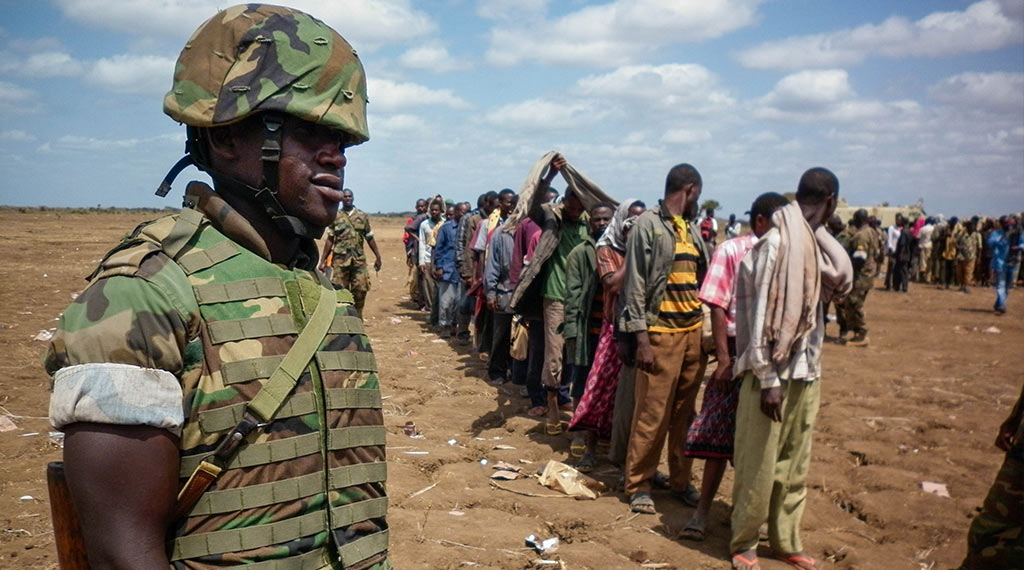
Two car bomb explosions rocked the town of Mahas in Somalia’s Hiran region last week, killing at least 35 people, including nine members of a single family, and wounding more than 40. Al-Qaeda-affiliated terrorist group Al-Shabab claimed responsibility for the suicide attack, saying it had targeted “apostate militias and soldiers.”
Al-Shabab militants have escalated their terrorist activities in response to Somali President Hassan Sheikh Mohamud’s pledge to fight and defeat the radical movement and cut off its financial sources. When Mohamud was elected in 2022, he declared an “all-out war” on the radical group by adopting a new security strategy with regional and international support.
The recent escalation reminds the international community that the war on terrorism is far from over and sparks renewed concerns about an expansion of the movement’s activity in the Horn of Africa.
From a mosque in the country’s capital, Mogadishu, the determined president called on young Somalis, who, as he said, were brainwashed by the radicals, to surrender to the security forces. He pleaded with the militants to denounce the terrorist ideology before it is too late.
Al-Shabab has always aimed to extend its operations beyond the borders of Somalia to destabilize the whole region. It has carried out terrorist attacks in Uganda, Kenya and Ethiopia. In 2020, Al-Shabab killed three Americans at a Kenyan military base used by US forces.
Following the defeat of Daesh in Iraq and Syria and the failure of its ideological mission, it is natural for Al-Qaeda and its affiliate terrorist organizations to think about a geographical area that would be easier to terrorize and control.
The world is preoccupied with the war in Ukraine, inflation, energy sources and several other challenges, but the UN Security Council remains concerned about the continued presence of terrorist groups in the Horn of Africa.
But the Somali government cannot confront and defeat Al-Shabab alone — it needs a global commitment to continue supporting the war-torn country.
In November, the UNSC voted to maintain an arms embargo on Somalia, albeit with modifications that reflected the government’s military improvements. Based on the resolution, Mogadishu can now import several significant weapons, such as portable surface-to-air missiles, combat drones, mortars and anti-tank guided missiles. But the overall embargo remains in place despite Somalia’s protestations.
How can an unstable country protect its citizens and defeat a bloodthirsty terrorist group without proper weaponry and equipment? Somalia’s UN Ambassador Abukar Osman warned that the embargo hinders the government’s efforts to counter Al-Shabab. According to the Associated Press, he added that victims of the country’s terrorist groups are asking why lifting the arms embargo is a threat to international peace and security while other countries are being armed to defend their territory and people. Addressing the UNSC, he said: “This unjust and unfair double standard is preventing the government of Somalia from legally obtaining lethal military equipment to rebuild its national army.”
Previous experiences in Iraq and Afghanistan have taught us that, when we send potent weapons to a government in a failed state, it is likely that these weapons will end up in the wrong hands. The Taliban ended up flying US Black Hawk helicopters and the pro-Iranian militias in Iraq drove US tanks during their military parades.
That being said, the deputy US representative to the UN urged his colleagues to support efforts to combat Al-Shabab and end its influence. “We are committed to using available tools to fight terrorism, including providing direct support to the (African Union) Transition Mission in Somalia and Somalia’s security forces, as well as utilizing the 751 Somalia sanctions regime to designate Al-Shabab operatives who continue to threaten peace and security in Somalia and throughout East Africa,” Richard Mills said.
The US administration has no time to focus on Al-Shabab terrorists, since the group’s direct threat to American national security is relatively weak, while China, Russia and Iran are at the top of President Joe Biden’s priority list.
For President Mohamud to confront Al-Shabab terrorism and prevent its threat from expanding in the region, he must overcome severe challenges and unite his people via a reconciliation strategy. Ideological militias always have the upper hand; their leverage comes from their lack of respect for humanity and willingness to kill thousands of innocent people to achieve an unfair political goal.
Such radical groups operate by illegally taxing people, trafficking people and drugs, and terrorizing residents to obey them without question.
The international war on terror should not stop or slow down while there are millions of people worldwide being taken hostage by a bloody and extreme ideology.
- Mamdani’s Mayoral Bid Reflects Rising Alliance Between America’s Democratic Socialists and Radical Political Islam - August 18, 2025
- Jordan arrests a wake-up call to Muslim Brotherhood threat - April 21, 2025
- Giving Muslim Extremists a Pass Is Reflected in Canada’s New Guide to ‘Islamophobia’ - March 27, 2025
